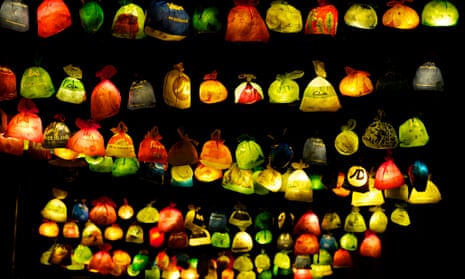Hold on to the dream! The 5p plastic bag levy takes effect on 5 October in England following (sluggishly) in the footsteps of Northern Ireland, Scotland and Wales (where in the first year the 5p charge saw the use of plastic bags drop by 96%).
But we’ve been close before with legislation – in 2008 the seven major UK supermarkets signed up to reduce the number of carrier bags by 50% yet later dropped this in favour of reporting how many they gave out.
In the US there’s constant pressure from organisations, such as the American Progressive Bag Alliance, to dent the USA’s 100bn-bag-a-year habit. Success for the Florida lobbyists: it’s illegal to ban plastic bags there.
The plastics industry and many retailers would rather solve all this by making plastic bags lighter or from compostable materials. They feel that plastic-bag pollution can be solved by better “dosage” from a checkout machine that dispenses fewer of them.
Research from Dr Danielle Green and Professor Richard Thompson on discarded plastic bags in coastal marshes shows they can cause the breakdown of the food chain relatively quickly – within nine weeks – as they smother the surface, blocking light, oxygen and nutrient flow, and reduce microalgae underneath. This research makes me thankful that EU states will have to reduce the number of carrier bags to 40 per person per year by the end of 2025 (we’re on around 90 to 100 per person at the moment).
Why do we even need 40? We once survived without single-use bags, until Swedish engineer Sten Thulin patented them in 1962. They do take hold quickly, though – Pakistan is set to get through 112bn this year, and only starting using them in 1982.
Their ubiquity means we rarely think about their origin. Low-cost crude oil (from the Middle East) is steam-cracked by enormous petrochemical companies and turned into PE (polyethylene) pellets. These are shipped to China to be manufactured into bags and low-cost plastic film, then they’re imported by very powerful retailers. Do you see where I’m going here? This is not a cottage industry. And although plastic bags only account for $10bn of a $370bn plastics industry, PE pellets are an important growth area.
Therefore the single-use plastic bag is basically a poster child for the “carbon bubble” (the looming $20tn shock from the fact that climate change hasn’t been valued into fossil fuel funds, according to a 2013 Carbon Tracker report). Never have dog-eared Bags for Life looked more like the future.

Green crush
When we think of recycling we tend to think of global markets and waste being spirited off to developing countries. In the construction industry you’re still lucky if recycling’s on the agenda: over 25m tonnes of waste a year goes straight from building sites to landfill. Artist Will Shannon has set up a concrete casting factory in the backyard of a Victorian house on Cairns Street in Toxteth, Liverpool, one of 10 sold off by Liverpool Council for £1 that are being refurbished by Granby Four Streets Community Land Trust. Shannon is turning broken roofing tiles and bricks from those houses into mantelpieces to be installed inside. Then the houses will be sold and rented to locals at affordable prices. That’s what we call a circular economy. For more information go to fact.co.uk/projects/build-your-own-tools-for-sharing.aspx
Greenspeak: Haulternative {ha:l’ternativ} noun
The ethical counter-movement that sees YouTube haulers - young fast-fashion consumers - switching to vintage, charity shop and sustainable hauls instead. All in the name of the Fashion Revolution
If you have an ethical dilemma, email Lucy at lucy.siegle@observer.co.uk
Follow Lucy Siegle on Twitter @lucysiegle
Follow the Observer Magazine on Twitter @ObsMagazine

Comments (…)
Sign in or create your Guardian account to join the discussion